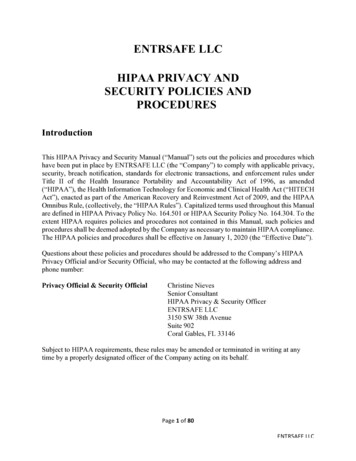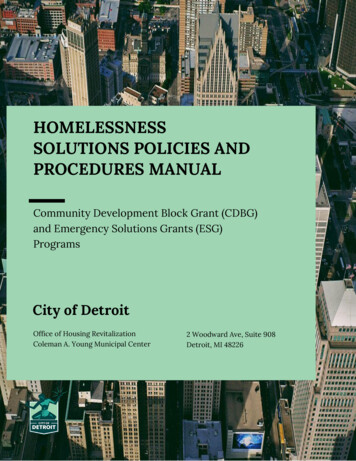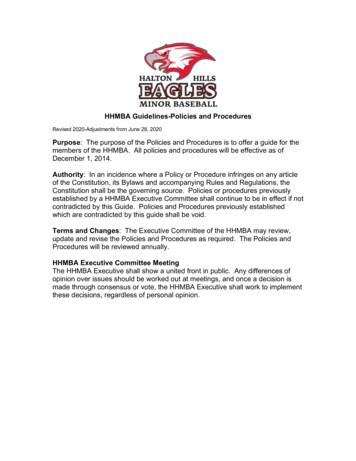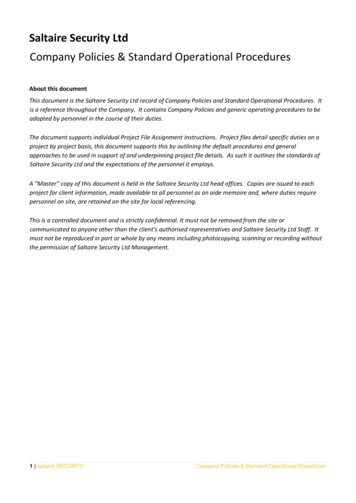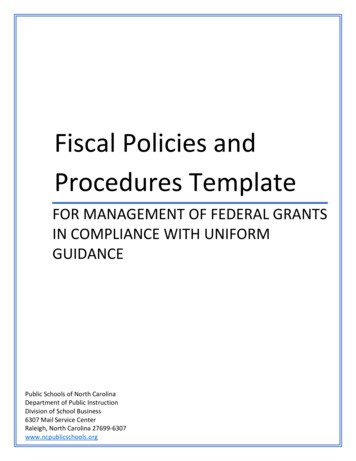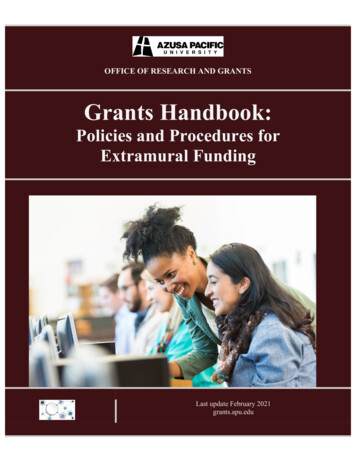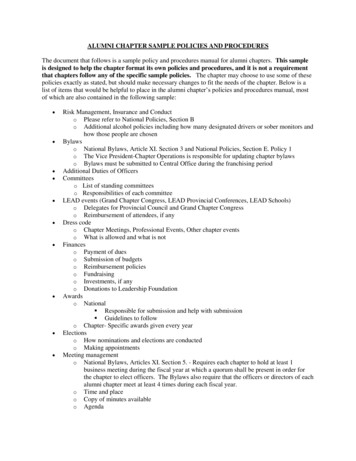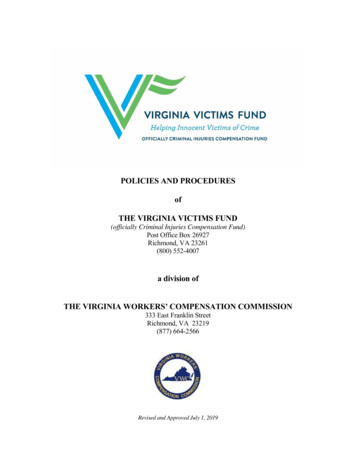
Transcription
POLICIES AND PROCEDURESofTHE VIRGINIA VICTIMS FUND(officially Criminal Injuries Compensation Fund)Post Office Box 26927Richmond, VA 23261(800) 552-4007a division ofTHE VIRGINIA WORKERS’ COMPENSATION COMMISSION333 East Franklin StreetRichmond, VA 23219(877) 664-2566Revised and Approved July 1, 2019
TABLE OF CONTENTSINTRODUCTION 3DEFINITIONS .5CONTACTS AND INFORMATION .6WHO MAY RECEIVE BENEFITS .8WHO MAY FILE A CLAIM 11WHEN A CLAIM MUST BE FILED .12WHERE A CLAIM MUST BE FILED 14CRITERIA FOR AN AWARD .15GROUNDS FOR DENIAL OR REDUCTION OF BENEFITS 20FUND PROCEDURES .31APPEALS .41AVAILABLE BENEFITS .44ADDITIONAL FUND RESPONSIBILITIES .58MISCELLANEOUS TOPICS .59CHECKLISTS 62VVF POLICIES AND PROCEDURES REVISED 7/1/2019PAGE 2
INTRODUCTIONOn July 1, 1977, the Virginia Compensating Victims of Crime Act was enacted tocompensate victims who suffer injuries as a result of a crime (§ 19.2-368.1 et seq., Code ofVirginia) (hereafter “the Act”). Benefits are limited to a total of 35,000 and are payable formedical expenses, wage loss, moving expenses, crime scene clean-up, counseling costs, andother expenses incurred by or on behalf of a victim. In homicide cases, funeral or burialexpenses are payable up to 10,000, eligible relatives may receive survivors’ counseling,and dependent survivors may receive compensation for loss of support from the victim.This program is administered by the Virginia Workers' Compensation Commissionthrough the Criminal Injuries Compensation Fund (hereafter, Virginia Victims Fund). It isfunded through fines levied against individuals convicted of felonies and misdemeanors inthe Courts of the Commonwealth [See § 19.2-368.18 (B) of the Act] and through federal grantsunder the Victims of Crime Act (VOCA). [See Victims of Crime Act of 1984, Pub. L. No. 104-235,codified at 42 U.S.C. §§ 10601-10605, 18 U.S.C. § 3771.]As of July 2008, the Fund also administers the Sexual Assault Forensic Exam(SAFE) Payment Program for the Commonwealth. Funds are transferred from the SupremeCourt for this purpose and the policies governing SAFE payments are approved by theCommission per §19.2-368.3(1)(i) of the Code in a separate manual. § 19.2-368.3 (1)(i)As of July 2018, the Fund was mandated to collect and disburse unclaimedrestitution pursuant to § 19.2-368.3 (9) of the Code of Virginia. Policies and proceduresfor the receipt, collection, and disbursement of unclaimed restitution to victims of crimeis held in a separate manual. § 19.2-368.3 (9)(10)VVF POLICIES AND PROCEDURES REVISED 7/1/2019PAGE 3
The Virginia Victims Fund issues this Policies and Procedures manual under theauthority, direction, and guidance of the Workers’ Compensation Commission. §19.2-368.3When administering the Fund and making claims determinations, this policy manual, theSAFE payment policy manual, the Unclaimed Restitution policy manual, the Act, and thegrant rules of the Victims’ of Crime Act [Victims of Crime Act of 1984, Pub. L. No. 104-235,codified at 42 U.S.C. §§ 10601-10605, 18 U.S.C. § 3771], must all be considered.VVF POLICIES AND PROCEDURES REVISED 7/1/2019PAGE 4
DEFINITIONSAs used throughout these guidelines, the following words and phrases shall have thefollowing meanings:“Act” shall mean the Compensating Victims of Crime Act, codified at § 19.2-368.1 etseq., Code of Virginia;“CA” shall refer to local Commonwealth’s Attorneys;“Commission” shall mean the Virginia Workers’ Compensation Commission;“DCJS” shall mean Department of Criminal Justice Services;“Director” shall mean the Director of the Fund;“Explanation of Benefits” shall mean the document that lists benefits paid and/or deniedfor claims submitted to the insurance carrier (commonly referred to as “EOBs”);“Full Commission” refers to the three legislatively appointed Commissioners of theCommission;“Fund” or “VVF” shall mean the Virginia Victims Fund (officially the Criminal InjuriesCompensation Fund);“Itemized Billing Statement” shall mean the type of bill that shows the individualcharges for all procedures performed and services rendered to the patient;“Medical Record” shall mean the written notes and reports concerning patients’diagnoses, symptoms, course of treatment, and prognoses;“Notice of Filing” shall mean a notification to medical and mental health providersnotifying them that a claim has been filed and that collection action may not betaken against the victim/claimant until a claim decision has been made;“VDEM” shall mean the Virginia Department of Emergency Management;“VOCA” shall mean the Federal Victims of Crime Act;“VWAP” or “VW” shall mean Victim/Witness Assistance Program or Victim/Witness;“WebFile” shall mean the Fund’s online claim submission and management system thatis available to victim advocates and medical providers.VVF POLICIES AND PROCEDURES REVISED 7/1/2019PAGE 5
CONTACTS AND INFORMATION(A)THE VIRGINIA VICTIMS FUNDClaim forms and additional information may be obtained by calling or writing:(B)(1)Telephone(800) 552-4007 (toll-free)(804) 823-6905 (fax)(2)Mailing AddressVirginia Victims FundPost Office Box 26927Richmond, VA 23261(3)Website and niavictimsfund.org(4)Fund LeadershipKassandra Bullock, DirectorTHE VIRGINIA WORKERS’ COMPENSATION COMMISSIONThe Workers’ Compensation Commission oversees the Virginia Victims Fund andhandles appeal requests. The Commission may be contacted as follows:(1)Telephone and Fax(877) 664-2566 (toll-free)(804) 367-6124 (fax)(2)Mailing AddressVirginia Workers’ Compensation Commission333 East Franklin StreetRichmond, VA 23219(3)Commission LeadershipR. Ferrell Newman, CommissionerWesley G. Marshall, CommissionerRobert A. Rapaport, CommissionerEvelyn McGill, Executive DirectorJason Quattropani, ClerkVVF POLICIES AND PROCEDURES REVISED 7/1/2019PAGE 6
(C)VICTIM/WITNESS ASSISTANCE PROGRAMSAlmost all cities and counties in the Commonwealth are served by Victim/WitnessAssistance Programs. These programs generally assist victims of crimes occurring withintheir service areas.Victim/Witness programs are established and operated by local governments, and theyare usually associated with either the local Commonwealth’s Attorney’s office or thelocal police department or sheriff’s office. The primary functions of VWAP are toexplain the criminal justice process to victims and witnesses of crime, to help victims andwitnesses understand their rights, and to assist victims and witnesses with mattersconcerning the arrest, trial, and incarceration of criminals.Victim/Witness programs and law-enforcement officers are required by law to informvictims of financial assistance that may be available to them as victims of crime, includinginformation about their possible right to file a claim for compensation from the VirginiaVictims Fund. § 19.2-11.01(A)(2)(a) Victim/Witness professionals often assist victims withfiling and perfecting their VVF claims, and they usually have VVF claim forms on hand.In localities without a VW program, or in areas in which the VW program does not workwith criminal injuries claims, claimants can often contact the local Commonwealth'sAttorney or law-enforcement agency for information and claim forms for the Fund. Forhelp locating or contacting the VWAP in any locality in Virginia, please call the Fund at(800) 552-4007 or the Victim Witness Assistance Network at (855) 4-HELP-VA. DCJSmaintains a directory of VW programs and other groups that assist victims. Please visit theirwebsite at www.dcjs.virginia.gov.Please note that because the Victim/Witness Assistance Programs are not part of the Fundor the Commission, delivering documents to a VW program is not the same as deliveringthem to the Fund. Victim/Witness programs can assist people with their claims with theFund. When documents are needed to support a claim or when a claimant needsinformation about his claim, the Fund should be contacted directly, as indicated above.Victim/Witness programs cannot guarantee eligibility or payment of expenses. Theseclaim and expense eligibility decisions cannot be made until completed claims arereceived and investigated by the Fund.VVF POLICIES AND PROCEDURES REVISED 7/1/2019PAGE 7
WHO MAY RECEIVE BENEFITS(A)ELIGIBLE PERSONS(1)Crime Victims(a) Any person who suffers personal physical injury or death as a directresult of a crime. §§ 19.2-368.2 and 19.2-368.4(A)(1)A crime is defined as:. . . an act committed by any person in the Commonwealth ofVirginia which would constitute a crime as defined by theCode of Virginia or at common law. However, no actinvolving the operation of a motor vehicle which results ininjury shall constitute a crime for the purpose of this chapterunless the injuries (i) were intentionally inflicted through theuse of such vehicle or (ii) resulted from a violation of § 18.251.4 or § 18.2-266 or from a felony violation of §46.2-894.§ 19.2-368.2(b) Any person who suffers personal emotional injury as a direct result of aviolent felony offense as defined in subsection C of §17.1-805, orstalking as defined in §18.2-60.3, or robbery or abduction, attemptedrobbery or abduction. §19.2-368.2(2)“Good Samaritans”Any person (except a law-enforcement officer engaged in the performance of hisduties) who suffers personal physical injury or death as a direct result of attemptingto prevent a crime from occurring in his presence or trying to apprehend a personwho (a) had committed a crime in his presence, or (b) had, in fact, committed afelony. §§ 19.2-368.2 and 19.2-368.4(A)(3)(3)Specific Relatives of Deceased VictimsA surviving spouse, parent, grandparent, sibling, or child, including posthumouschildren, of a victim of a crime who died as a direct result of such crime.§ 19.2-368.4(A)(2)“The term ‘child’ shall include a stepchild, a legally adopted child, a posthumouschild, and an acknowledged illegitimate child, but shall not include a marriedchild; and the term ‘parent’ shall include stepparents and parents by adoption.”§ 65.2-515VVF POLICIES AND PROCEDURES REVISED 7/1/2019PAGE 8
(4)Relatives of Deceased “Good Samaritans”A surviving spouse, parent, grandparent, sibling or child, including posthumouschildren, of any person who dies as a direct result of trying to prevent a crime orattempted crime from occurring in his presence, or trying to apprehend a person whohad committed a crime in his presence or who had, in fact, committed a felony.§ 19.2-368.4(A)(4)“The term ‘child’ shall include a stepchild, a legally adopted child, a posthumouschild, and an acknowledged illegitimate child, but shall not include a marriedchild; and the term ‘parent’ shall include stepparents and parents by adoption.”§ 65.2-515(5)Legal DependentsAny other person legally dependent for his principal support upon a victim of crimewho dies as a result of such crime or who dies as a direct result of trying to prevent acrime or attempted crime from occurring in his presence, or trying to apprehend aperson who had committed a crime in his presence or had, in fact, committed afelony. § 19.2-368.4(A)(5)“The term ‘child’ shall include a stepchild, a legally adopted child, a posthumouschild, and an acknowledged illegitimate child, but shall not include a marriedchild; and the term ‘parent’ shall include stepparents and parents by adoption.”§ 65.2-515(6)Individual taking responsibility for Funeral ExpensesAny person who pays expenses directly related to funeral or burial is eligible forreimbursement. §19.2-368.11:1 (E)(B)INELIGIBLE PERSONS(1)Law Enforcement PersonnelLaw-enforcement officers engaged in performance of their duties are not eligible forawards from the Fund. § 19.2-368.4(A)(3) Officers who are injured (or familymembers of officers who are killed) in the line of duty should contact the Workers’Compensation Commission regarding possible eligibility for workers’ compensationbenefits.VVF POLICIES AND PROCEDURES REVISED 7/1/2019PAGE 9
(2)Criminally Responsible PersonsA person who is criminally responsible for the crime upon which a claim is based, oran accomplice or accessory of such person, shall not be eligible to receive an awardwith respect to such claim. § 19.2-368.4(B)(3)Unjust BenefitA person is not eligible if he is a criminally responsible person who would unjustlybenefit from an award. § 19.2-368.4(A)VVF POLICIES AND PROCEDURES REVISED 7/1/2019PAGE 10
WHO MAY FILE A CLAIM(§ 19.2-368.5)(A)ELIGIBLE PERSONSAny person eligible to receive benefits under § 19.2-368.4 and § 19.2-368.11(E) may file aclaim. For specifics concerning eligibility, see Who May Receive Benefits (pages 8-10).(B)MINORSWhen the eligible person is a minor, a parent or guardian must file on their behalf. § 19.2368.5(A)On occasion, a non-parent who has legal custody but not legal guardianship of a minor filesa claim for benefits on the minor’s behalf. In such a case, the Fund will accept the claim butwill only make payments up to 35,000 directly to service providers such as doctors andcounselors. The Fund cannot make payments directly to a legal custodian who is neither thechild’s natural parent nor his legal guardian. (Policy of the Commission, April 7, 1999)Custodians may wish to seek legal guardianship through the courts. If the custodian isunable to afford an attorney, he should contact local legal services organizations to see if hequalifies for low-cost or free legal aid. Only the legal aid organizations can determinewhether claimants qualify for representation, whether the organizations handle legalguardian appointment cases, and whether it is advisable or possible for any particular personto seek appointment as a child’s legal guardian.(C)INCAPACITATED PERSONSA guardian, conservator, or other individual authorized to administer the estate of anincapacitated person who is eligible for benefits may file a claim on behalf of theincapacitated person. § 19.2-368.5(D)MULTIPLE CLAIMANTSIf a deceased victim has several relatives or dependents, each eligible person may file aclaim. However, all claims that arise from the death of the same individual will beconsidered together. See Subsection A of § 19.2-368.6 The Court of Appeals has held that thismeans if several relatives of one homicide victim file claims, the award will be apportionedamong the claimants.VVF POLICIES AND PROCEDURES REVISED 7/1/2019PAGE 11
WHEN A CLAIM MUST BE FILED(§ 19.2-368.5)(A)GENERAL RULEIn general, claims must be filed no later than one (1) year after the date of the crime,unless good cause can be shown for late filing for all crimes occurring after July 1, 2001.(The one-year filing limit became effective July 1, 1998. Before July 1, 1998, claimantswere required to file within 180 days after the occurrence of the crime.) For crimesoccurring between July 1, 1998, and July 1, 2001, victims could not file more than twoyears past the date of the crime. Any claims for crimes occurring prior to July 1, 2001,will be returned to the claimant with an explanation for the return.In cases where the crime was committed on or after July 1, 1977, and before July 1, 2001,the Commission may, for good cause shown, extend the time for filing a claim if theattorney for the Commonwealth submits written notice that the crime is beinginvestigated as a result of newly discovered evidence. The Commission will consideronly expenses that the claimant accrues after the date of newly discovered evidence asstipulated in the written notification by the attorney for the Commonwealth.(B)WHEN THE VICTIM DIESIf the crime victim dies, a claim must be filed no later than one (1) year after the date ofdeath.(C)MINORSIf the claimant is a minor, the time for filing a claim is tolled as provided in subsection A of§ 8.01-229. In general, the section provides that a minor must file his claim within one (1)year after he is legally emancipated (see § 16.1-331) or reaches the age of majority,whichever occurs first. Victims of child sexual assault may file up to ten years past thedate of their eighteenth birthday. See §19.2-368.5 (B)(iii)(D)INCAPACITATED PERSONSIf the victim is incapacitated, the time for filing a claim is tolled as provided in subsection Aof § 8.01-229. Generally, an incapacitated person must file his claim within one (1) yearafter the incapacity is removed. However, if a legal guardian or committee has beenappointed, the claim must be filed within one (1) year after the date of the crime orwithin one (1) year after the appointment, whichever occurs later.VVF POLICIES AND PROCEDURES REVISED 7/1/2019PAGE 12
(E)FORFEITURESIn a case involving claims made by a victim against profits of crime forfeited and held inescrow pursuant to Chapter 21.1 of Title 19.2 (§ 19.2-368.1 et seq.), the claim shall be filedwithin five years of the date of the order of forfeiture.Any proceeds or profits received or to be received directly or indirectly, except propertythat may be forfeited to the Commonwealth pursuant to §§ 19.2-386.15 through 19.2386.31, by a defendant or a transferee of that defendant from any source, as a direct orindirect result of his crime or sentence, or the notoriety which such crime or sentence hasconferred upon him, shall be subject to a special order of escrow.(F)GOOD CAUSE FOR DELAYIn cases other than those involving minors, incapacitated persons, or claims againstforfeited property, upon good cause shown, the Commission in its discretion may extendthe time for filing. Written explanation as to why the claimant waited longer than oneyear to file is required. This only applies to crimes occurring after July 1, 2001.VVF POLICIES AND PROCEDURES REVISED 7/1/2019PAGE 13
WHERE A CLAIM MUST BE FILED(§19.2-368.5)An application may be submitted via mail, fax, or in person. Victim advocates that havebeen through specialized training may file via WebFile, the Fund’s online claims submissionsystem.Virginia Victims FundPost Office Box 26927Richmond, VA 23261Fax: (804) 823-6905The application constitutes an affidavit and is made under oath under penalties of perjury.§ 19.2-368.16 For this reason, the Fund must receive the signed, notarized claim form to beginprocessing the claim. An unsigned and un-notarized claim will be returned to the addressfrom which it originated.Applications are available from Victim/Witness offices throughout the Commonwealth andonline at http://www.virginiavictimsfund.org.All other documents in support of a claim can be accepted via fax at (804) 823-6905 or e-mailat info@virginiavictimsfund.org.VVF POLICIES AND PROCEDURES REVISED 7/1/2019PAGE 14
CRITERIA FOR AN AWARDIn order to make an award, the Commission must find that (A) a crime was committed;(B) the crime resulted in personal physical or emotional injury to, or death of, the victim;(C) the crime was promptly reported to law enforcement; (D) the claim was timely filedwith the Fund; (E) the victim's loss is compensable under the Act; (F) the claim has aminimum value of 100; (G) the claimant is eligible under the Act; and (H) if the crimedid not occur in Virginia, the victim is a resident of Virginia who was (i) injured inanother state, country, or territory that does not compensate nonresident crime victims, or(ii) injured or killed as a result of foreign terrorism. Each of these criteria is discussedbelow. Payment of a forensic exam under the SAFE program is not a guarantee ofeligibility for the Fund.(A)A CRIME OCCURRED(1)Definition of CrimeIn § 19.2-368.2, “crime” is defined as follows: an act committed by any person in the Commonwealth of Virginiawhich would constitute a crime as defined by the Code of Virginia orat common law. However, no act involving the operation of a motorvehicle which results in injury shall constitute a crime for thepurpose of this chapter unless the injuries (i) were intentionallyinflicted through the use of such vehicle or (ii) resulted from aviolation of § 18.2-51.4 or 18.2-266 or from a felony violation of§ 46.2-894.(2)Lack of Arrest or ConvictionIt is not necessary that the alleged criminal be apprehended, prosecuted for, orconvicted of any crime based upon the incident. Claims shall be investigated anddetermined regardless of whether a defendant has been arrested, tried, convicted,acquitted, or found not guilty of a crime. § 19.2-368.6(C) However, the victim oraward recipient is required to fully cooperate with all law-enforcement agencies per§ 19.2-368.10(3). If a case is dropped, nolle prosequi, or the offender is found notguilty, the Fund must be advised of the reason for this action to ensure that thevictim cooperated with all prosecution efforts.(3)Motor Vehicle InjuriesThe definition of “crime” provides that no act involving the operation of a motorvehicle that results in injury shall constitute a crime for the purposes of the Actunless the injuries resulted from a violation of § 18.2-51.4.This means that, ordinarily, injuries caused by motor vehicles cannot becompensated. There are three exceptions. First, if a driver intentionally injuresVVF POLICIES AND PROCEDURES REVISED 7/1/2019PAGE 15
someone with an automobile, the Fund can consider an award. Second, if theinjuries resulted from a violation of DUI laws (driving under the influence), theFund will consider this a crime within the meaning of the Act. § 19.2-368.2(Coverage of DUI crimes is mandated by VOCA. See subsection (b)(1) of 34U.S.C. § 20101.) Third, § 46.2-894, commonly referred to as Felony Hit and Run,became an eligible compensable crime on July 1, 2012. Applications for this typeof crime based on incidents occurring prior to July 1, 2012, cannot be consideredas the law is not retroactive.(a)Intoxication or DUI OffensesIf the victim was injured as a result of a violation of DUI laws, the injurymay be compensable if intoxication on the part of the offender caused thevictim’s injuries.A victim of a DUI accident will ordinarily be eligible under the Act if theoffender (1) is convicted under § 18.2-266 or § 18.2-51.4; (2) refuses ablood alcohol test but is convicted; (3) has a blood alcohol level of .08regardless of conviction; or (4) there is a preponderance of evidence of driverintoxication in information obtained through law-enforcement agencies orcourt records.(b)Intentional Injury by Motor VehicleUnder this exception to the general rule that an injury caused by a motorvehicle is not compensable, the Act requires that the driver actually intendedto harm the victim.(c)Duty of Driver to Stop in Event of Accident Involving Injury orDeathCommonly referred to as Felony Hit and Run, § 46.2-894, became aneligible compensable crime on July 1, 2012. Applications for this type ofcrime based on incidents occurring prior to July 1, 2012, cannot beconsidered as the law is not retroactive.(4)Attempted CrimesAn attempted crime is an unfinished crime and is composed of two elements – theintent to commit the crime, and the doing of some act toward its consummation butfalling short of the accomplishment of the ultimate design. Attempted crimes arecrimes, and a defendant may be charged with and tried for an attempt, or a judgemay reduce a criminal charge to an attempt. §§ 18.2-25 - 18.2-29 The Fund treatsattempted crimes as crimes for the purposes of the Act. § 19.2-368.2VVF POLICIES AND PROCEDURES REVISED 7/1/2019PAGE 16
(B)THE CRIME RESULTED IN PERSONAL PHYSICAL/EMOTIONAL INJURY ORDEATHThe Act provides that no award shall be made unless the Commission finds that a crimedirectly resulted in personal physical or emotional injury to or death of the victim. §§ 19.2368.2 and 19.2-368.10Property damage cannot be compensated under the Act. Thus, if a car is stolen while theowner is away from the vehicle, the owner is certainly the victim of a crime, but he hassuffered no personal injury and will be unable to recover the value of his car from the Fund.Consistent with federal law, the exception to this policy is replacement of windows andlocks of the victim’s residence damaged as a result of a crime as defined in §19.2-368.2.VOCA allows the Fund to reimburse crime victims for clothing or bedding taken asevidence. In order to reimburse this expense, the Fund must have copy of the evidencereceipt provided to the victim by a law-enforcement agency. The Fund must also have areceipt for the purchase of a like item that matches the description of the items on theevidence receipt.Although the Fund has no authority to compensate victims for property loss, damage toproperty that is inseparable from a personal injury can qualify as a medical expense and maybe compensable. For instance, if a person has a prosthetic leg and the artificial limb isdamaged during an assault, the Fund will treat the loss as a personal injury and pay for areplacement prosthesis. The Fund will reimburse victims for prosthetic devices that are lostor damaged in the course of being subject to a crime as defined in §19.2-368.2. Prostheticdevices are defined as items needed by the victim to perform daily activities such aswalking, eating, or dressing. Some examples of prosthetic devices are eyeglasses, contactlenses, dentures, and artificial limbs. In order to determine if the device is a true prosthetic,the Fund will consider the span of time between the incident and the purchase of the item.(C)THE CRIME WAS PROMPTLY REPORTED TO POLICEThe crime must be reported to proper law-enforcement officials within 120 hours after itoccurs. If a claimant or his survivors fail to report within 120 hours of the crime, theCommission may excuse the delay if, for good cause shown, it finds the delay to have beenjustified. § 19.2-368.10 A written explanation by the claimant documenting reason for thedelayed filing of the claim is required. Victims of child sexual assault are exempt from thisrequirement.(D)THE CLAIM WAS TIMELY FILEDFor specifics concerning filing period, see When A Claim Must Be Filed (page 12). If theclaim is filed over a year following the date of the crime, written explanation by the claimantdocumenting good cause for the delay is required.VVF POLICIES AND PROCEDURES REVISED 7/1/2019PAGE 17
(E)THE CLAIMANT'S LOSS IS COMPENSABLE UNDER THE ACTFor specifics concerning what benefits are available, see Available Benefits (page 44).Expenses that are generally compensable include wage loss, loss of support from a deceasedvictim, unreimbursed medical expenses, funeral or burial expenses, counseling, expensesattributable to pregnancy resulting from forcible rape, moving expenses, and otherreasonable, necessary, and appropriate expenses. Generally, the Fund does not pay forproperty loss. The Commission lacks authority to award attorneys’ fees. § 19.2-368.11:1(F)THE CLAIM HAS A MINIMUM VALUE OF 100The Act provides that to qualify for an award, a claim must have a minimum value of 100 after being reduced as provided in subsection G. § 19.2-368.11:1(H) If the value ofthe claim exceeds 100, and the individual is an eligible claimant, but there are noexpenses that can be paid by the Fund, the claim will receive an award for “recordpurposes only.” This means that the claim was valued at 100, but there were no eligibleexpenses for which the Fund could pay. The claimant is allowed two years from the dateof filing to submit additional items for payment.(G)THE CLAIMANT IS ELIGIBLE UNDER THE ACTFor specifics concerning eligibility, see Who May Receive Benefits (pages 8-10).(H)CRIME LOCATION AND VICTIM’S RESIDENCYAs long as the crime was committed in Virginia, there is no requirement that the victim be aVirginia resident or United States citizen to be eligible for an award under the Act.However, crimes that occur outside Virginia are generally not compensable. There are twoexceptions.First, the Fund may compensate Virginia residents who are injured or killed in foreigncountries or as a result of foreign terrorism. § 19.2-368.2 The Office for Victims of Crime(OVC) of the US Department of Justice operates the International Terrorism Victims’Expense Reimbursement Program (ITVERP). If a Virginia resident is injured duringforeign terrorism occurring abroad, they may recover under the Virginia program afterapplying to ITVERP.Second, the Fund may compensate Virginia residents who are victims of compensablecrimes in foreign countries or territories that do not have funding mechanisms for crimevictims [for crimes occurring after July 1, 2002, enactment date of § 19.2-368.4(C)(ii)].The Office for Victims of Crime maintains a list of foreign countries that have crime victimcompensation programs. Please visit their website at www.ovc.gov.In summary, if a Virginia resident is injured during a crime occurring outside of theCommonwealth, they should apply for benefits with the crime victims’ compensationprogram in the state, country, or territory where the crime occurred.VVF POLICIES AND PROCEDURES REVISED 7/1/2019PAGE 18
A list of state compensation programs can be found at www.nacvcb.org or by calling theNational Association of Crime Victim’s Compensation Boards at (703) 780-3200. [See, e.g.U.S. Justice Department, Office for Victims of Crime, NEW DIRECTIONS FROM THE FIELD: VICTIMS’RIGHTS AND SERVICES FOR THE 21ST CENTURY, pp. 325, 353 (1997).]VVF POLICIES AND PROCEDURES REVISED 7/1/2019PAGE 19
GROUNDS FOR DENIAL OR REDUCTION OF BENEFITS(A)CONDUCT BY A VICTIM OR CLAIMANT THAT MAY REDUCE OR BAR ANAWARDThere are five circumstances in which conduct by a claimant or victim may reduce or baran award under the Act: (1) the claimant is criminally responsible for the crime; (2) aperson who is criminally responsible for the crime will unjustly benefit from an award;(3) the victim failed to promptly report the crime; (4) the victim or claimant failed toc
THE VIRGINIA VICTIMS FUND (officially Criminal Injuries Compensation Fund) Post Office Box 26927 Richmond, VA 23261 (800) 552-4007 a division of THE VIRGINIA WORKERS' COMPENSATION COMMISSION 333 East Franklin Street Richmond, VA 23219 (877) 664-2566 Revised and Approved July 1, 2019.



